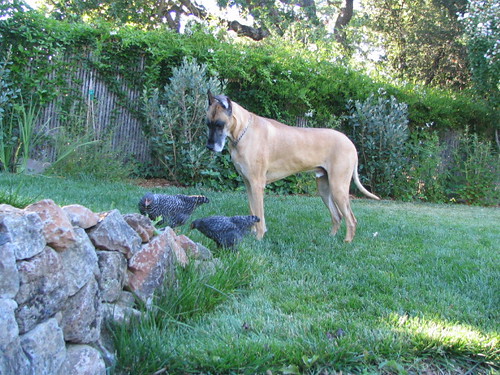Part of me sides with Ms. Hanavan in seeing the wonderful aspects of raising one's own small flock and isn't it a rather innocuous infraction to keep a couple chooks around for the "virtuous circle" returns?
Another part of me sides with Mr. Harper in pointing out that the chooks are a violation of the law and shouldn't be scratching around in city limits to begin with. The fact Mr. Harper is blaming the rats on Ms. Hanavan's keeping chickens only serves to weaken his argument, in my opinion, as chicken feed isn't sufficient to attract rats the way human trash is (and isn't Halifax a wharf city anyway with all its rat-ty goodness? I digress...)
Whether or not Ms. Hanavan's actions elevate to the level of civil disobedience is the topic of another discussion. The fact of the matter is she chose to keep illegal animals in the city and was busted for doing so.
I discovered a new dimension to the story this morning when I read Jim Meek's story, Urban Chickens as eco-warriors, and he pointed out the ages of the parties in question: Ms. Hanavan is 25 years old while Mr. Harper is 74 years old. Jim makes this observation on the difference in ages:
I’m guessing that a generation gap emerges in the public reaction to this story. Few people in Mr. Harper’s age group — the demographic that votes in city elections, by the way — want to see farm animals in the city.I wonder if Meek is onto something here? When I check out the profiles of folks who've linked to this blog or commented here, they're mostly my generation, in their mid 20s to low 40s, (except you, Grannie Annie!) and, like me, they're discovering the joys of having something in their own backyard that otherwise has been relegated to agriculture on a much larger scale outside the city. No wonder urban chick farmers also seem to be backyard gardeners, too.
At the same time, the under-30 demographic that posts comments to websites is more likely to support homegrown efforts to make the world a greener, better place.
It also turns out that older cities are more likely to be chicken-fearing than chicken-rearing.
Maybe it's just an angle the press is already exploiting, but it seems the folks lining up on the "not near my backyard" side of the urban chicken movement are of a previous generation.
Indeed, in looking back at my posts about chicken ordinances in Winona and Missoula and Duluth and Durham, the protagonists (the ones seeking to make/keep chickens legal in town) all seem to be young while the antagonists (the ones seeking to keep chickens out of the urban setting) seem to be older. Maybe Linda can provide context on the Chicago situation?
I wonder if the urban chicken issue is bringing up an emotional issue regarding the urbanization of society? If one grew up in a rural setting where chickens weren't something "green and neat" and instead were part of the fabric of staying alive (growing one's own food), there's ample room for chicken images and sounds to bring up emotional baggage from a bygone time. I could see how moving to the city and away from the farm would be seen as a major achievement what with the escape form unpleasant smells and sounds of livestock.
A coworker of mine (she's my age) grew up on a farm in Ohio and had dozens if not hundreds of chickens in her life as a girl. She's very happy to be a city-dweller now and has no desired to go back to her rural roots. In talking with her, she's amused that I think raising a couple chickens is such a great thing because to her, chickens are a dirty, smelly source of chores and why would she ever subject herself to that again? I see her point and am not trying to convert her to fall in love with my birds ("a chicken's a chicken"). And she happily tolerates my "gee-whiz" bewilderment of how great raising chooks is for our family. Respect on both sides.
She's more than happy to keep chickens a thing of her past. And I'm more than happy to keep them present and future thanks to the zoning ordinances here in Redwood City.
Maybe ordinances banning urban chickens are seen as a way to institutionalize "urban progress" by drawing a thick black line between behaviors deemed to be kept out in the country and those deemed acceptable for city-dwellers?
Regardless of why the older generation, in the words of Mr. Meek, "fears the chicken," it's up to us, who "rear the chicken," to help overcome their prejudice by being good stewards of the urban chicken movement, legally keeping our chickens in the city, treating our birds well and sharing the bounty.
What do you think? Is it a generational thing? Is it an urban progress thing? Is it just a green thing?


